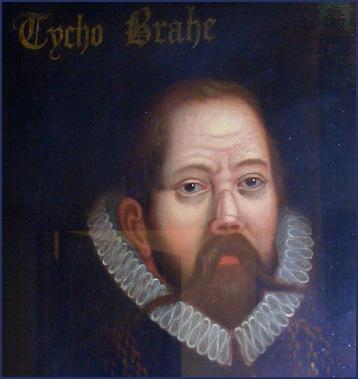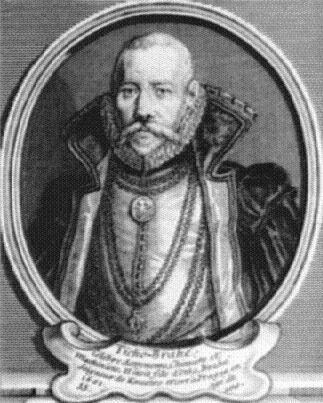The Sleepwalkers (132 page)
Authors: Arthur Koestler

Only
one
hope
remained:
Tycho.
The
previous
year,
Tycho,
in
a
letter,
had
expressed
the
hope
that
Kepler
would
"some
day"
visit
him.
Though
he
was
panting
and
pining
for
"Tycho's
treasure",
the
invitation
was
couched
in
too
general
terms,
and
the
journey
too
long
and
costly.
Now,
however,
it
was
no
longer
a
matter
of
scientific
curiosity
for
Kepler,
but
of
the
urgent
necessity
of
finding
a
new
home
and
a
livelihood.
Tycho,
in
the
meantime,
had
been
appointed
Imperial
Mathematicus
by
Rudolph
II,
and
had
taken
up
residence
near
Prague.
Kepler's
long-awaited
opportunity
came
when
a
certain
Baron
Hoffmann,
Councillor
to
the
Emperor,
had
to
return
from
Gratz
to
Prague,
and
agreed
to
take
him
along
in
his
suite.
The
date
of
Kepler's
departure
for
the
meeting
with
Tycho
is,
by
the
courtesy
of
History,
easy
to
remember:
it
was
1
January,
anno
domini
1600.
IV TYCHO
DE
BRAHE
1.
The Quest for Precision
JOHANNES
KEPLER
was
a
pauper
who
came
from
a
family
of
misfits;
Tycho
de
Brahe
was
a
grand
seigneur
from
the
Hamlet
country,
the
scion
of
truculent
and
quixotic
noblemen
of
pure
Danish
stock.
His
father
had
been
Governor
of
Helsingborg
Castle,
which
faces
Elsinor
across
the
Sund;
his
Uncle
Joergen,
a
country
squire
and
vice-admiral.
This
Uncle
Joergen,
being
childless,
had
extracted
a
promise
from
his
brother,
the
Governor,
that
if
he
had
a
son,
Joergen
could
adopt
him
and
bring
him
up
as
his
own.
Nature
seemed
to
sanction
this
arrangement,
for,
in
1546,
the
Governor's
wife
bore
him
twin
sons;
but
unfortunately
one
of
them
was
still-born,
and
the
father
went
back
on
his
promise.
Joergen,
a
true,
headstrong
Brahe,
waited
until
another
son
was
born
to
his
brother,
then
kidnapped
the
firstborn,
Tyge
–
Tycho.
The
Governor,
also
in
true
Brahe
fashion,
threatened
murder,
but
quickly
cooled
off
and
generously
consented
to
the
fait
accompli
,
knowing
that
the
child
would
be
well
looked
after
and
inherit
some
of
Joergen's
fortune.
This
came
indeed
to
pass
and
sooner
than
expected,
for
while
Tyge
was
still
a
student,
his
foster-father
met
an
untimely
and
glorious
end.
He
had
just
returned
from
a
naval
battle
against
the
Swedes,
and
was
riding
in
the
suite
of
his
King
over
the
bridge
joining
Copenhagen
to
the
royal
castle,
when
the
good
King,
Ferdinand
II,
fell
into
the
water.
Joergen,
the
vice-admiral,
jumped
after
him,
saved
his
King
and
died
of
pneumonia.
Whether
Tyge
suffered
a
traumatic
shock
by
being
kidnapped
from
his
cradle
we
cannot
know;
but
the
blood
of
the
Brahes
and
his
education
by
the
irascible
vice-admiral
must
have
sufficed
to
turn
him
into
an
eccentric
in
the
grand
style.
This
was
visible
at
first
glance,
even
in
his
physical
appearance:
for
if
Tycho
was
born
with
a
silver
spoon
in
his
mouth,
he
later
acquired
a
nose
of
silver
and
gold.
As
a
student,
he
fought
a
duel
with
another
noble
Danish
youth
in
the
course
of
which
part
of
Tyge's
nose
was
sliced
off.
According
to
a
contemporary
account,
1
the
quarrel
originated
in
a
dispute
as
to
which
of
the
two
noble
Danes
was
the
better
mathematician.
The
lost
piece,
which
seems
to
have
been
the
bridge
of
the
nose,
was
replaced
by
a
gold
and
silver
alloy,
and
Tycho
is
said
to
have
always
carried
a
kind
of
snuffbox
"containing
some
ointment
or
glutinous
composition
which
he
frequently
rubbed
on
his
nose".
2
In
his
portraits,
the
nose
appears
as
a
too
rectilinear,
cubistic
feature
among
the
curves
of
a
large,
bald,
egg-shaped
head,
set
between
the
cold,
haughty
eyes
and
the
aggressively
twirled
handlebar
moustache.

